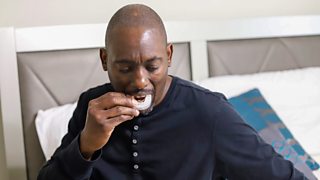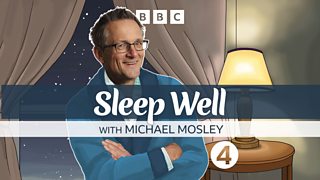Do anti-snoring products actually work?
Four in every 10 people in the UK snore. It's a serious issue for many of us and, beyond a broken night's sleep, has even been blamed for the breakdown of relationships. There are a number of snoring products that claim they can help, from throat sprays to nasal strips, and even a chinstrap that literally keeps your mouth shut while you sleep!
For ±«Óãtv Radio 4's Sliced Bread, host Greg Foot looked into these products for listener Neville. Neville got in touch to find out if any of these options can help to reduce his very loud snoring (his wife recorded the evidence!).
He also hoped one of them might mean he could enjoy a pint on a Friday night and not snore! Here's what Greg discovered…

1. Snoring is often caused by a vibration of the uvula
When we're asleep, our muscles relax and the position of our jaw and tongue shift. So when we breathe in during sleep our upper airway narrows, heightening resistance to the incoming air and this can create vibrations particularly from the uvula, the soft dangly bit at the back of our throat, but also tonsils and the back of your tongue. Your tongue is a bigger factor if it is larger in relation to your jaw and if you sleep on your back.

Due to factors like weight gain around the neck, more men snore than women, at a ratio of 2 to 1.
2. Alcohol intake and excess weight will increase the likelihood of snoring
If you've drunk alcohol that will relax the tongue more, or if you have gained weight, your tongue, like any other muscle, will be larger – and both of these will affect snoring. Weight gain around the neck also impacts on snoring. This is usually an issue for men and helps explain why more men snore than women, at a ratio of 2 to 1.
"I suspect that evens itself out around the time of the menopause," consultant ENT surgeon and rhinologist Raj Bhalla, "and those numbers become a little bit more comparable."
3. Sprays could reduce snoring by lubricating the back of the throat
Throat sprays range quite a bit in price from £9.50 for 25ml (including Snoreeze and Boots' own brand) to £25.99 for 35ml for Rhynil. They all claim, in their own words, to reduce vibration of soft tissue by lubrication, and each use different active ingredients.
Though some sprays say they last eight hours, Bhalla suggests they may last more like 3 to 4 hours but that should cover the deepest part of the sleep cycle.
There are studies on the sprays, and although there isn't very strong evidence for them, Bhalla says that sprays "have a place" and that they can work by "lubricating the mucous membranes at the back of the throat and by reducing the amount of vibration." This is particularly the case for people who breathe through their mouth rather than their nose, Bhalla points out, as they tend to have a drier lining in the back of their throat.
4. Sprays can also act as a decongestant
Raj thinks that some of the sprays have a kind of decongestant effect, "opening up the airways and opening up the sinuses and the nasal passages" and so reducing the volume of any snoring. The decongestant effect comes from different ingredients in different products – in Snoreeze it's likely the peppermint oil.

5. Breathe strips can open up the nasal passages
If sprays aren't working then, Raj advises, it’s time to try something else. Breathe strips or nasal strips are another option. They can open up the nasal air flows by stretching open the middle of the nose called the 'vault' and by widening the passages inside the nose. However, if your nose is not blocked this is unlikely to be an effective option.
6. Mouth guards need to be tailored to the individual
Mouth guards – or 'mandibular advancement devices' – pull the jaw forward, forcing the tongue off the back wall of your throat. With your tongue now sitting in your jaw, it takes less pressure to breathe in.
Greg found a mouth guard in Boots retailing at £35 and there are, as Raj points out, self-mouldable options you can buy more cheaply on the internet. The drawback, however, is that "it's very difficult to get the right sort of shape to be able to pull your jaw forward as effectively as you might think." Raj refers his patients who are 'tongue-based snorers' to a dentist to mould guards tailored to the individual.
7. Other approaches include chin straps and electric shocks!
They sound like they belong in a nightmarish film but there is a chin-strap option (available from £10) that keeps your mouth closed during sleep (in an endeavour to reduce mouth breathing) and devices that vibrate or give an electric shock (to wake you up a little to stop you mid-snore!). The straps are not the most comfortable option, as Raj notes, meanwhile, the vibration or electric shock method tends to lead to a poor night’s sleep!
It sounds like something from a nightmare but there is a chin-strap option.
8. Your lifestyle impacts on your snoring
There are a number of viable options for Neville to consider, but Raj also advises that "it's worth looking a little bit deeper as to what a solution they might be. Is it your lifestyle? Have you gained a little bit of weight? Do you have any erratic sleeping patterns? Are you drinking too much?" Raj says that he can't stress enough how massively these factors might have an impact on your snoring.
Find out what options Neville went for, and if he can get the best of both worlds – his pint and a good night's sleep for his wife – by listening here.
The information contained in this article was correct at the time of broadcast on 11 May, 2023.

More from ±«Óãtv Radio 4
-
![]()
Sliced Bread: Hay Fever Treatments
What works to help with the symptoms of hay fever?
-
![]()
Sliced Bread: Herbal Sleep Aids
Can teas, herbal tablets and oils or sprays send us to sleep?
-
![]()
Sleep Well with Michael Mosley
Relax, unwind and discover how your breath can help usher in sleep.
-
![]()
Nine amazing facts to help you sleep better
Neuroscientist Dr Matthew Walker talks to Joe Wicks about how to sleep well.




